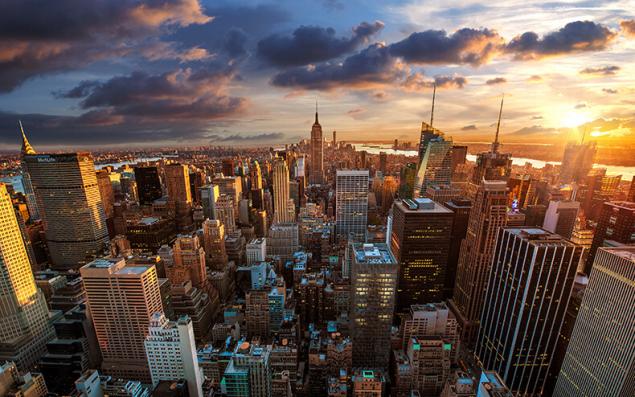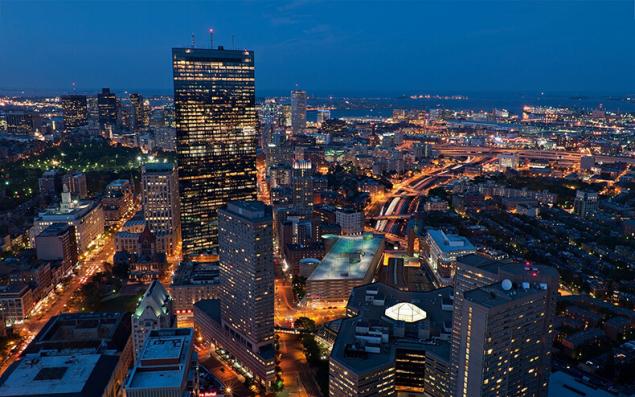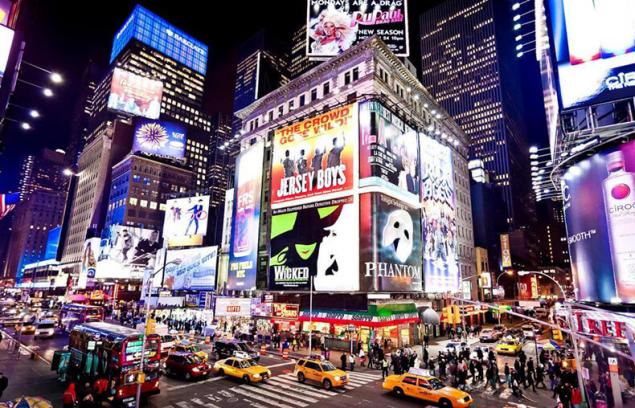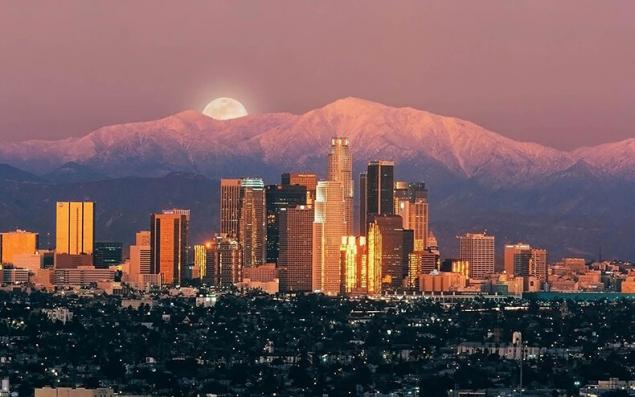770
Paul Graham: Where to live now in order to succeed
Gurus of the venture capital world Paul Graham — founder of Y Combinator, Creator of Yahoo! Store and author of the book Hackers & Painters — shares his business philosophy.
Great cities attract ambitious people. You can feel it, walking around the city. In a hundred subtle ways the city tells you: you can do more; you should exert more effort.
Amazing how different can be these feelings. New York, above everything else, tells you need to earn more. Of course, there are other hints. You need to be fashionable. Need a better look. But the clear message emanating from new York – you need to be richer.
What I like about Boston (or rather Cambridge) is that there is another signal: you need to be smarter. You need to have time to read all those books that you long wanted.

When asking what are the signals sends the city, sometimes get fascinating answers. Like in Silicon valley nor respect the mind, the Valley reports the following: need to be more powerful.
It's not the same feeling that occurs in new York. Power is important and in new York, of course, but new York is easy to make a billion dollars, even if you just inherited it.
In Silicon valley it is not going to impress anyone except a few sellers of real estate. In Silicon valley it is important, what effect do you have on the world. Why do people from the Valley are so concerned about the person of Larry and Sergey? Not because they are rich, but because they control Google, and Google affects the lives of almost everyone.
How important are the signals that sends the city? In practice, the answer is clear: very important. You may think that if you had enough mental energy to do something beautiful, your surroundings would not have you value. The place where you live, there should be little difference. But if you look at historical facts, it changes a lot. Most of the people who created something great, was boring in a few places where these great things were done constantly.
The city is a powerful force. Almost every Italian painter of the 15th century was Florence, though Milan then was as a large city. The inhabitants of Florence are genetically different from the people of Milan, so it is logical to assume that Milan also had to be born an artist with the abilities of Leonardo da Vinci. But then what happened to him?
Even if a person possesses the talents of Leonardo, does not overcome the force of the environment, do you think that you can do this?
I don't think so. I am a hard man, but never would fight with that power. It is better to use it. So I've thought a lot about where I live.
I always thought that the ideal place in Berkeley, California. But when I finally moved there a couple of years ago, it turned out that it is not so. The signal sent Berkeley to live better. Life in Berkeley is very civilized. This is probably the only place in America where people from Northern Europe will feel right at home. But there are no ambitions.
And in fact, it is not surprising that such a pleasant place that attracts people who are more concerned with quality of life. The people you meet, say, in Cambridge (mA), get there not by accident. They make sacrifices to live there.
It is expensive and at times sloppy, the weather is often not good. Therefore, people living in Cambridge – people who want to live where the smartest, even if it is dirty, expensive city with bad weather. Cambridge is a city which produces ideas, while new York is a city of Finance, and Silicon valley – area startups.

When discussing the city in this manner, is actually talking about people. For a long time the city was just a crowd of people. But things have changed. New York- in the classic big city. But Cambridge is only a part of the city, and Silicon valley, no city.
Maybe the Internet will change everything even more. Maybe someday most important thing your community is virtual, and it will not matter where you live in the geographical sense. But I wouldn't rely on it. The physical world has a very large bandwidth, and sometimes the city send signals very subtle ways.
The city speaks to you mostly by accident – that's what you see in Windows, it's conversations that you randomly hear. These signals do not have to specifically look for, but you cannot disable them.
My friend who moved to Silicon valley in the late 1990s, said the worst there is low quality of overheard conversations. Then it seemed to me that it's just an eccentric opinion. Of course, it is interesting to hear other people's conversations, but really their quality is so important that you are ready to change their place of residence? Now I understand what she was saying, overheard the conversation, I say to you, among what kind of people you live.

No matter how self-motivated you are, it's hard not to be influenced by other people. And not that you do exactly what you want city but you get upset when no one is around don't care what you want to do.
Between enthusiasm and disappointment there is a balance between obtaining and losing money. Most people overestimate the negative monetary values: they are much harder to avoid losing a dollar than to earn a dollar. Similarly, although there are a lot of people, sufficiently strong to resist in some occupation that you imposed just because "everyone does it", yet very few people strong enough to continue to work on something, what do not care all around.
Each city focuses on a particular type of ambition. Cambridge – intellectual capital, not only because there are smart people, but because there is nothing that these people would take care more. In new York or the valley of the professors are second-class citizens – until they establish your hedge Fund or startup.
It suggests the answer to a question that has long concerned new Yorkers: can new York become a center for start-UPS rivaling Silicon valley? One reason why it is unlikely is that the people creating startups in new York, will feel second-class citizens. In new York, people admire something else. And new York is losing Silicon valley in the game of wealth: the ratio of new Yorkers and Californians on the Forbes list of 400 already fallen from 81:56 in 1982 to 73:88 in 2007.

Not all cities send signals, but only those that are centers of certain ambitions. Not having lived in the city, it is difficult to say what kind of signals it emits.
In Los Angeles most importantly, it seems, thank. There is a list of people who are now most in demand, and the main achievement is to get this list or make friends with someone from it. But even apart from that the signals are about the same as in new York, perhaps with an emphasis on physical attractiveness.
In San Francisco the signals seem the same as in Berkeley: you need to live better. Although this may change if enough startups prefer San Francisco Silicon valley. In the years of the Internet bubble such preferences seemed to be a symptom of the failure is like buying expensive office furniture. Even startups are now based in San Francisco, makes me suspicious. But if you live there enough good entrepreneurs, the center of gravity will move back.
I haven't seen cities, the likes of the Cambridge intellectual ambitions. Oxford and Cambridge (the one in England), like Ithaca or Hanover: the signal is, but not so strong.
Paris was once a great intellectual center. But I tried to live there and saw that the ambitions of its residents – not intellectually. Today, Paris is sending a signal: go for it style. In fact, I liked it. Paris – the only city where I lived, where the people sincerely interested in art.
And here's another bugle call, which I caught in London still (a little) you can feel the urge to be more aristocratic. If you listen, like you can hear in Paris, new York or Boston. But in other places the signal is very weak and unstable.
Here is the complete list of signals that I caught in different cities: wealth, style, fashion, physical attractiveness, fame, political power, economic power, intelligence, class superiority and the quality of life.
From this list me some good. I always thought ambition is a good thing, but now I realize it's because I always meant by this ambitions in the areas that concern me the most. When you list all what have ambitions of ambitious people, this looks so pretty.

Do I have anyone who wants to achieve excellent results, to live in a big city? No. All great cities inspire some ambition but for some types of employment, all you need is a handful of talented colleagues.
City give the audience and funnel retractor is equal to you people. This is not so important in math and science where the entire audience is your colleagues, and all you need is a faculty with the right colleagues. In areas such as art, journalism or technology, an important more General environment. They have the best professionals are not concentrated in a few top departments and laboratories. In these more chaotic fields is most advantageous to work in a big city: you have to feel all this encouragement coming from others and to find colleagues.
It is not necessary to live in a big city all my life, so that its mechanisms worked for you. Key years is the beginning and the middle of your career. And of course, do not have to be born and to grow up in a big city. And don't even have to go to school in this city.
But when crossing to the next, more difficult step, it is best to be in a place where you can find peers and support. When you find both, and you can leave. Take the Impressionists: they were born and died all over France, but decisive for them was the years spent together in Paris.
If you are still not sure, what you want to do, and where the main center for those who engaged in it, it is more efficient, probably, to try to live in several cities, while you are still young. You never know which signal takes a city until you live there. Sometimes assumptions are incorrect: I moved to Florence in 25 years, thinking that I would see an arts centre but it turned out that I was late for 450 years.
Even when the city was still seething with ambition, it's impossible to know for sure whether to resonate the signal with your aspirations, yet you will not hear him. When I moved to new York, I was thrilled. This exciting place. It took some time to realize that I'm not quite the same as the local residents.
How our habits create us
Rules of life from Russian writers
Some people are already at the age of 16 know what they will do. But the most ambitious young people the very existence of ambition seems to be preceded by understanding what these ambitions arise. They know what they want to do something great. But I haven't decided whether rock stars or brain surgeons.
There is nothing wrong. But it does mean that if you have an ambition the most common, you will have to find a place to live by trial and error. Probably, you will have to find a city where you feel at home, to understand what kind of your ambitions.published
Author: Paul Graham
Source: ideanomics.ru/?p=923
Great cities attract ambitious people. You can feel it, walking around the city. In a hundred subtle ways the city tells you: you can do more; you should exert more effort.
Amazing how different can be these feelings. New York, above everything else, tells you need to earn more. Of course, there are other hints. You need to be fashionable. Need a better look. But the clear message emanating from new York – you need to be richer.
What I like about Boston (or rather Cambridge) is that there is another signal: you need to be smarter. You need to have time to read all those books that you long wanted.

When asking what are the signals sends the city, sometimes get fascinating answers. Like in Silicon valley nor respect the mind, the Valley reports the following: need to be more powerful.
It's not the same feeling that occurs in new York. Power is important and in new York, of course, but new York is easy to make a billion dollars, even if you just inherited it.
In Silicon valley it is not going to impress anyone except a few sellers of real estate. In Silicon valley it is important, what effect do you have on the world. Why do people from the Valley are so concerned about the person of Larry and Sergey? Not because they are rich, but because they control Google, and Google affects the lives of almost everyone.
How important are the signals that sends the city? In practice, the answer is clear: very important. You may think that if you had enough mental energy to do something beautiful, your surroundings would not have you value. The place where you live, there should be little difference. But if you look at historical facts, it changes a lot. Most of the people who created something great, was boring in a few places where these great things were done constantly.
The city is a powerful force. Almost every Italian painter of the 15th century was Florence, though Milan then was as a large city. The inhabitants of Florence are genetically different from the people of Milan, so it is logical to assume that Milan also had to be born an artist with the abilities of Leonardo da Vinci. But then what happened to him?
Even if a person possesses the talents of Leonardo, does not overcome the force of the environment, do you think that you can do this?
I don't think so. I am a hard man, but never would fight with that power. It is better to use it. So I've thought a lot about where I live.
I always thought that the ideal place in Berkeley, California. But when I finally moved there a couple of years ago, it turned out that it is not so. The signal sent Berkeley to live better. Life in Berkeley is very civilized. This is probably the only place in America where people from Northern Europe will feel right at home. But there are no ambitions.
And in fact, it is not surprising that such a pleasant place that attracts people who are more concerned with quality of life. The people you meet, say, in Cambridge (mA), get there not by accident. They make sacrifices to live there.
It is expensive and at times sloppy, the weather is often not good. Therefore, people living in Cambridge – people who want to live where the smartest, even if it is dirty, expensive city with bad weather. Cambridge is a city which produces ideas, while new York is a city of Finance, and Silicon valley – area startups.

When discussing the city in this manner, is actually talking about people. For a long time the city was just a crowd of people. But things have changed. New York- in the classic big city. But Cambridge is only a part of the city, and Silicon valley, no city.
Maybe the Internet will change everything even more. Maybe someday most important thing your community is virtual, and it will not matter where you live in the geographical sense. But I wouldn't rely on it. The physical world has a very large bandwidth, and sometimes the city send signals very subtle ways.
The city speaks to you mostly by accident – that's what you see in Windows, it's conversations that you randomly hear. These signals do not have to specifically look for, but you cannot disable them.
My friend who moved to Silicon valley in the late 1990s, said the worst there is low quality of overheard conversations. Then it seemed to me that it's just an eccentric opinion. Of course, it is interesting to hear other people's conversations, but really their quality is so important that you are ready to change their place of residence? Now I understand what she was saying, overheard the conversation, I say to you, among what kind of people you live.

No matter how self-motivated you are, it's hard not to be influenced by other people. And not that you do exactly what you want city but you get upset when no one is around don't care what you want to do.
Between enthusiasm and disappointment there is a balance between obtaining and losing money. Most people overestimate the negative monetary values: they are much harder to avoid losing a dollar than to earn a dollar. Similarly, although there are a lot of people, sufficiently strong to resist in some occupation that you imposed just because "everyone does it", yet very few people strong enough to continue to work on something, what do not care all around.
Each city focuses on a particular type of ambition. Cambridge – intellectual capital, not only because there are smart people, but because there is nothing that these people would take care more. In new York or the valley of the professors are second-class citizens – until they establish your hedge Fund or startup.
It suggests the answer to a question that has long concerned new Yorkers: can new York become a center for start-UPS rivaling Silicon valley? One reason why it is unlikely is that the people creating startups in new York, will feel second-class citizens. In new York, people admire something else. And new York is losing Silicon valley in the game of wealth: the ratio of new Yorkers and Californians on the Forbes list of 400 already fallen from 81:56 in 1982 to 73:88 in 2007.

Not all cities send signals, but only those that are centers of certain ambitions. Not having lived in the city, it is difficult to say what kind of signals it emits.
In Los Angeles most importantly, it seems, thank. There is a list of people who are now most in demand, and the main achievement is to get this list or make friends with someone from it. But even apart from that the signals are about the same as in new York, perhaps with an emphasis on physical attractiveness.
In San Francisco the signals seem the same as in Berkeley: you need to live better. Although this may change if enough startups prefer San Francisco Silicon valley. In the years of the Internet bubble such preferences seemed to be a symptom of the failure is like buying expensive office furniture. Even startups are now based in San Francisco, makes me suspicious. But if you live there enough good entrepreneurs, the center of gravity will move back.
I haven't seen cities, the likes of the Cambridge intellectual ambitions. Oxford and Cambridge (the one in England), like Ithaca or Hanover: the signal is, but not so strong.
Paris was once a great intellectual center. But I tried to live there and saw that the ambitions of its residents – not intellectually. Today, Paris is sending a signal: go for it style. In fact, I liked it. Paris – the only city where I lived, where the people sincerely interested in art.
And here's another bugle call, which I caught in London still (a little) you can feel the urge to be more aristocratic. If you listen, like you can hear in Paris, new York or Boston. But in other places the signal is very weak and unstable.
Here is the complete list of signals that I caught in different cities: wealth, style, fashion, physical attractiveness, fame, political power, economic power, intelligence, class superiority and the quality of life.
From this list me some good. I always thought ambition is a good thing, but now I realize it's because I always meant by this ambitions in the areas that concern me the most. When you list all what have ambitions of ambitious people, this looks so pretty.

Do I have anyone who wants to achieve excellent results, to live in a big city? No. All great cities inspire some ambition but for some types of employment, all you need is a handful of talented colleagues.
City give the audience and funnel retractor is equal to you people. This is not so important in math and science where the entire audience is your colleagues, and all you need is a faculty with the right colleagues. In areas such as art, journalism or technology, an important more General environment. They have the best professionals are not concentrated in a few top departments and laboratories. In these more chaotic fields is most advantageous to work in a big city: you have to feel all this encouragement coming from others and to find colleagues.
It is not necessary to live in a big city all my life, so that its mechanisms worked for you. Key years is the beginning and the middle of your career. And of course, do not have to be born and to grow up in a big city. And don't even have to go to school in this city.
But when crossing to the next, more difficult step, it is best to be in a place where you can find peers and support. When you find both, and you can leave. Take the Impressionists: they were born and died all over France, but decisive for them was the years spent together in Paris.
If you are still not sure, what you want to do, and where the main center for those who engaged in it, it is more efficient, probably, to try to live in several cities, while you are still young. You never know which signal takes a city until you live there. Sometimes assumptions are incorrect: I moved to Florence in 25 years, thinking that I would see an arts centre but it turned out that I was late for 450 years.
Even when the city was still seething with ambition, it's impossible to know for sure whether to resonate the signal with your aspirations, yet you will not hear him. When I moved to new York, I was thrilled. This exciting place. It took some time to realize that I'm not quite the same as the local residents.
How our habits create us
Rules of life from Russian writers
Some people are already at the age of 16 know what they will do. But the most ambitious young people the very existence of ambition seems to be preceded by understanding what these ambitions arise. They know what they want to do something great. But I haven't decided whether rock stars or brain surgeons.
There is nothing wrong. But it does mean that if you have an ambition the most common, you will have to find a place to live by trial and error. Probably, you will have to find a city where you feel at home, to understand what kind of your ambitions.published
Author: Paul Graham
Source: ideanomics.ru/?p=923























